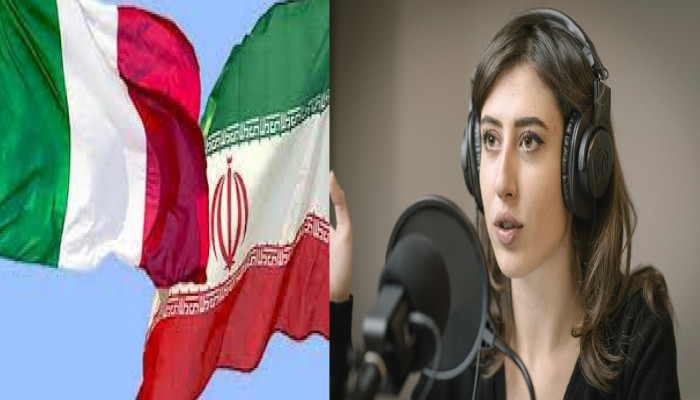Iran warns Italy with strained ties over US pressure on drone suspect
- In Reports
- 02:54 PM, Jan 04, 2025
- Myind Staff
On Friday, Iran issued a warning to Italy that their good relationship could be at risk if Italy supports the United States' political agenda by arresting an Iranian engineer. The arrest is based on a U.S. warrant linked to a drone attack in Jordan last year that killed three American soldiers.
Iran's foreign ministry called in Italy's ambassador, Paola Amadei, to deliver this message, according to the official IRNA news agency. This happened just a day after Italy summoned Iran's ambassador to discuss the detention of an Italian journalist in Tehran. The repeated diplomatic summons highlighted how the situation involving the two prisoners was becoming increasingly complex for Italy. Italy, a long-time ally of Washington, also has a history of good relations with Tehran. On December 16, Italian authorities issued a US warrant to arrest Mohammad Abedini at Milan's Malpensa airport. He and another Iranian were charged by the US Justice Department for providing Iran with the drone technology used in the January 2024 attack on a US station in Jordan that resulted in the deaths of three US personnel.
Three days later, Cecilia Sala, an Italian reporter for the Il Foglio daily, was detained in Tehran. She had arrived in Iran on December 13 with a journalist visa and was arrested on charges of violating the laws of the Islamic Republic, according to IRNA. Italian commentators believe that Iran might be holding Sala to use her as leverage for the release of Abedini. Both the Italian and Iranian governments have made public statements connecting the two cases. According to IRNA, a foreign ministry official, “Majid Nili Ahmadabadi, told Amadei that Rome's continued detention of Abedini was an illegal act that is done based on the US demand and in line with the political and hostile goals of the country to hold Iranian nationals hostage in various points in the world".
To avoid harming the bilateral ties between the US and Rome, Nili called for Abedini's release as soon as feasible. All eyes will thus be on the Milan Court of Appeals, which has set a hearing for January 15 to determine whether to place Abedini under house arrest or retain him at Milan's Opera jail until the beginning of the drawn-out extradition procedure to the United States. The US government has not publicly responded to Abedini's petition, but in the past, it has raised concerns with Italy's justice ministry about several cases where suspects wanted by the US escaped from the Italian justice system before they could be extradited. On Friday, Abedini's lawyer, Alfredo De Francesco, visited him in prison and asked about Sala. He said that Abedini had heard about Sala's case while in prison and didn't understand how it was related to him. “He asked me if she had been arrested and how she had been arrested, and why in some way they wanted to connect her to him, the lawyer said. I explained the situation to him, even what is said on television because it is useless to deny it, but I explained to him.”
The lawyer pointed out that although the two cases seem unrelated, Abedini became emotional when she heard about her situation. “He asked me to write the name of Cecilia Sala on a piece of paper we had with pen, so that he could correctly pronounce her name, De Francesco told reporters outside the prison. He was very moved by this thing, to know that she is a woman in prison right now, and so he prays for her, for him.” FBI experts examined the drone navigation system used in the Jordan assault and linked it to Abedini and his co-defendant, who was then charged by US federal authorities with export control offences. US prosecutors have stated that Abedini's company in Tehran makes navigation systems for Iran's paramilitary Revolutionary Guard's military drone program.
Iran's embassy in Italy has linked Sala's situation to Abedini, saying in a statement on X that they will respect Sala's rights and expect Italy to do the same for Abedini. This complicated diplomatic situation is creating a challenge for Italy's government under Premier Giorgia Meloni, especially after the embarrassment of losing track of another high-profile individual wanted by the US. In 2022, Russian businessman Artyom Uss, wanted by the US for alleged sanctions violations, escaped from Italy while under house arrest, despite US warnings that he might flee. Uss, the son of a Russian regional governor, later reappeared in Russia. Meloni recognised that there were serious issues in how his case was handled and ordered an investigation. Milan's chief prosecutor, Francesca Nanni, has opposed Abedini's request for house arrest, stating that he is a flight risk. She added that even guarantees from Iran's consulate in Milan were not enough to ensure he wouldn't flee.
Next week, Meloni will host President Joe Biden on his last international tour before he leaves office, which may raise the subject. Historically, Iran has had more peaceful diplomatic relations with Italy than with other European countries like Britain, France, and Germany. These countries often accuse Tehran of supplying short-range ballistic missiles to Russia and producing weapon-grade uranium, which Iran denies.







Comments